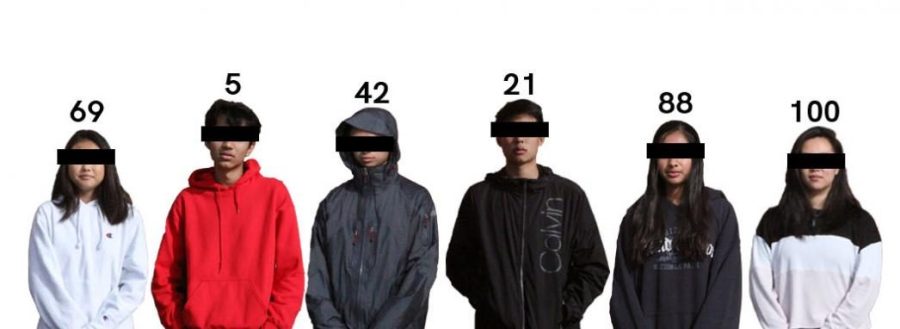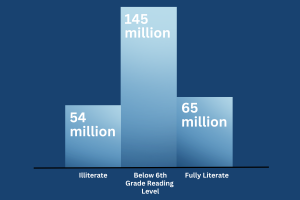Drugs, sex, shame — with a side of Rice
Individuals stand in a line, eyes censored and mock Rice Purity scores hovering above them, symbolizing the article’s central angle: with Rice Purity scores, people are reduced to a number.
December 11, 2019
Some students compete over athletics, while others compete over academics. All too often, teenagers love competition. Enter the Rice Purity Test. Now, students can spend their time comparing how many times they have used drugs or ways they have had sex. This online quiz claims to measure one’s purity on a scale of 1-100. Simple enough? Not quite. The test is unhealthy, as it diminishes students’ experiences to a mere number while encouraging them to engage in misconduct.
The Rice Purity Test is a survey first administered by Rice University in 1924. The test asks 100 yes-or-no questions to output a numerical score, with 100 being the “most pure” and 0 being completely “impure.” The first test was given only to women in order for Rice to gauge how risqué their female population was. It often resulted in shaming: women with scores below 70 were often viewed as immoral, whereas those with scores above 90 were seen as uptight. The test has since become popular worldwide, despite retaining its most fundamental problem: it reduces test-takers’ complex experiences to a single numerical value.
“The Rice Purity Test puts you in a lose-lose situation,” senior Katherine Wang said. “It’s made many people I know feel terrible about themselves. You feel embarrassed if your score is too high, and it constantly encourages you to be ‘cool’ by trying to check as many things as you can off the list.”
The Rice Purity Test has instigated a culture of unhealthy comparison among teens. It is not uncommon to hear friends talking among themselves about how low their scores are, as a show of how adventurous they have been. The result is dangerous: it fosters an environment where students are avidly looking for ways to lower their own scores to impress their peers.
“While I think the Rice Purity Test is a fun thing to joke about among my friends, it does pose dangers,” said junior Vivek Verma. “Many kids brag about how low their scores are, creating a culture of peer pressure.”
The questions on the Rice Purity Test are worrisome — some questions go as far as to ask about getting arrested or getting convicted of a felony. Even the more “moderate” questions — having sex in public, doing methamphetamine, shoplifting — encourage actions that could have grave consequences on impressionable young teens. In an environment where a lower score has a higher value, the test ironically perpetuates the negative behavior that it was intended to humiliate. Simply, it’s the worst bucket list ever created.
“When I first took the test, I was a little uncomfortable,” said sophomore Arwen Ma. “I know it’s not a big deal, but when my score ended up being lower than those of my friends, it was easy to feel judged and conscious of myself as a person.”
As Ma expressed, the test can also cause low scorers to feel bad, for fear of being too “impure.” This idea of impurity is primitive and has no place in an era where we strive for progressive change. Therefore, it is important to remember that this test is an extremely limited metric — these 100 questions are anything but exhaustive and are incapable of encompassing the breadth and depth of one’s own life. As such, it cannot accurately measure someone’s virtue on the basis of such a limited set of questions.
It is clear that throughout its history, the Rice Purity Test has remained a symbol of arbitrarily quantifying one’s own worth. While on the surface it may seem like harmless fun, it is imperative that one considers the insecurity and potential harm it can cause once administered.
Missing tests is not usually encouraged, but perhaps this one is worth skipping.





























































John • Jul 20, 2022 at 7:50 pm
I’m the creator of https://www.arealme.com/rice-purity-test/en/ – first launched in late 2019. I can’t believe there are so many copycats recreating content with our idea and code.
Michael • Feb 15, 2022 at 11:02 am
I just wonder why people https://ricepuritytestnow.com/ want to recreate what has already been done. However, the implementation of the site is very successful.
Ammy • Jan 6, 2022 at 11:29 am
Just curious why people wanted to recreate https://www.ricepuritytests.net/ , which has already been done. But the execution of the site is very well done
Rice alumnus • Feb 20, 2021 at 2:27 am
It would be very nice if the claims about the test’s origin were attributed or out-linked — this story is the first Google result for “Rice Purity Test origin,” and I would love to know where that information came from.
Ash Martin • Oct 9, 2020 at 11:22 am
Do you want to know about your personality? Do you want the number which says how much Idiotic Minded animal you are or how much a funny person are you? Then, you must take on the Dumb Test for yourself.